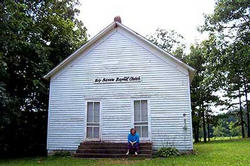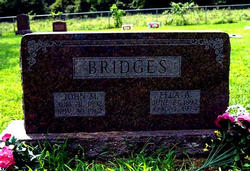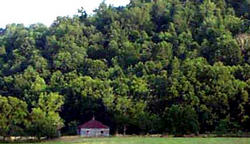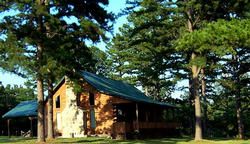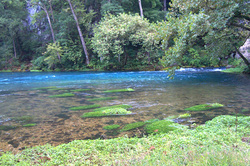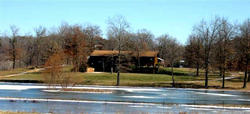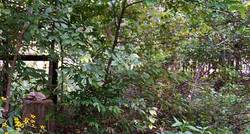Missouri Memories
Ozark Memories Warm A Nostalgic Heart
Big Barren Community
Big Barren is nestled in a valley in the southern Missouri Ozarks where I like to go visiting in my mind quite often, though not nearly often enough in the flesh. There never was a store that I know of, or anything that could make it anything other than a community. There were several farms once, a one-room school house and a church with a cemetary beside it. There are still a few farms there but not many. They are gone now, like the open stock range and acorn fed hogs that were once the norm.
Big Barren church overlooks a rocky, sometimes dry, creek for which it's named. It was the social center of the community for generations of hard working farm families.
It is silent now, a small whitewashed wood sentinal observing the changing times with dignity. Church services are almost never conducted here now but the memories of times past live on as long as the people who made them come home to visit. Someone, the Heaven family probably, have thoughtfully provided a book for visitors to sign and they do, filling book after book with their name, their family name and the name of the place they migrated to after leaving here.
So many of the people who once met here every week have passed on to whatever awaits on the other side.
My grandparents, John Milbourne Bridges and Ella Alice Rongey Bridges rest in the Big Barren cemetary. They were good people, honest and hardworking. They were the parents of Connie, Leta, Vesta and my dad Lester.
The following was written by my Aunt Connie in 1979
Big Barren Church
Connie Bridges Reddin, 1979
There's so many days I remember
At the church at the foot of the hill
It was there I accepted the Savior
And the memories are fresh with me still
If the weather was cold
We built a fire in the old wood stove
If it was too warm we used cardboard fans
From the funeral home
Once a year we had homecoming
Folks would come from miles around
After the morning worship
We had dinner on the ground
We sang and prayed and read God's Word
That inspired writers wrote
And we played the old piano
We didn't mind if it missed a note
Going to church at night we rode
In a wagon pulled by old Harvey and Jack
And if we weren't too sleepy
We would sing all the way back
My Daddy sang bass, Mommy high soprano
Leta, Lester, Vesta and I joined in on the songs
We've all scattered now
And raised families of our own
Mommy and Daddy and my husband have now all gone on
When God's through with me here
Do not for a burial plot search
Just bury me beside the others near Big Barren Church.
Aunt Connie shared this poem with her nieces in 1979.
Bridges, Davis, Heavin, Stevens, Reddin, Hurt, Buffington, Lewis, Pigg, Grindstaff, were some of the families who lived here.
Younger generations moved to St. Louis, Poplar Bluff, Doniphan, Springfield and Columbia in search of jobs. Others moved farther afield, the automobile factories in Flint, Michigan and fish canneries in Oregon, coal mines in West Virginia. California, Texas, Arkansas and Tennesse are some of the states that offered wages. Some would return "home" when they retired, though most have not. Even though they cherish their years in this remote wilderness,their children have grown up in a different area and that is where their roots are now. Mine are in Texas now but Big Barren owns a part of heart and it always will.
Below: Marvin and Vesta Stevens homeplace
Some of the houses have rotted and fallen down, the land reclaimed by forest. But a few old farm houses, unoccupied for years, still stand here and there...their wood gray and weathered, topped with a sheet iron roof.
From a distance the Stevens home place seems little changed, having withstood the passing of time amazingly well. I wish I could say I have weathered the passing of time so well.
It is the windows in the old houses that have changed most. They have a lost, bewildered look about them as they gaze unblinking from quiet, dusty, rooms that appear to be empty except for dust and spider webs. But the rooms will never really be empty, not as long as our memories continue to come home to visit.Below: Alan and Mary Stevens home
New houses have sprung up here and there, neat and modern with central heat and air, most are home to those who moved away to make a living and returned after retirement.
Alan and Mary Stevens built a beautiful log house when Alan retired from the Forest Service. It is a joy beyond measure to sit on their porch overlooking a small pond as I did on a morning a couple of years ago. We sipped coffee and talked. From the forest that starts at his property line we heard the call of a bird I had not heard since leaving the Ozarks.
"Is that?" I asked my face alight with excitement.
"Yep, an Indian hen," my cousin Alan replied smiling.
Others call the colorful bird a Piliated Woodpecker. It is large, perhaps as large as a crow. It has a red head and a pointed top knot and its call sounds a little like someone laughing. Scared me speechless first time I heard one while I was walking through the woods to school.
Big Spring, near Van Buren, Missouri
I went looking for the one-room school where I attended 8th grade but the building is gone and the forest is reclaiming the spot where it once stood. The only sign that a school had ever been there was a small concrete pallet that once supported a hand pump that brought cold water pouring forth to fill our cups at recess.
There were only 12 students in school the year I attended and I was the only one in 8th grade. There was a wood stove for heat. It had a metal jacket around it so no one would accidentally fall on it and get burned. We brought lunches from home in empty syrup buckets. And there were no indoor restroom facilities. Marie Heavin, who was only 18 at the time, was the teacher in the 1953/54 school year. Despite her young age, she was a very good teacher.
The Book Mobile brought books from the town of Doniphan which was about 40 miles away. It was our greatest treat. This was years before television came along and even our radio exposure was limited. Books were magic carpets on which we could fly around the world. I have never outgrown my love of books and always have one on my nightstand and usually have them scattered in other areas of my house and in my car.
